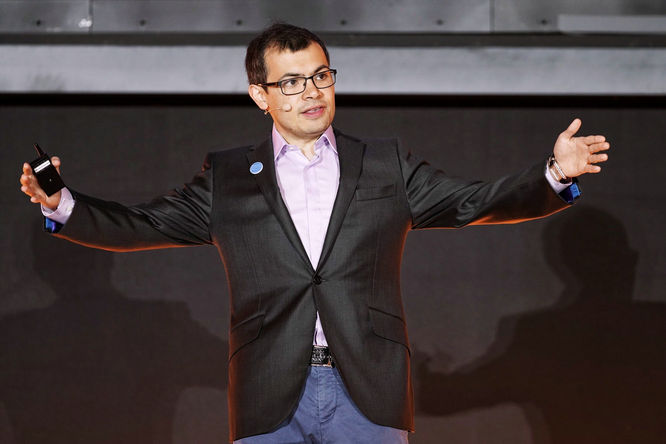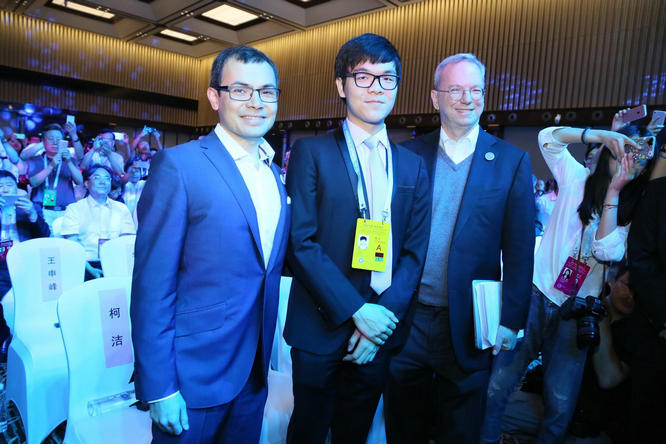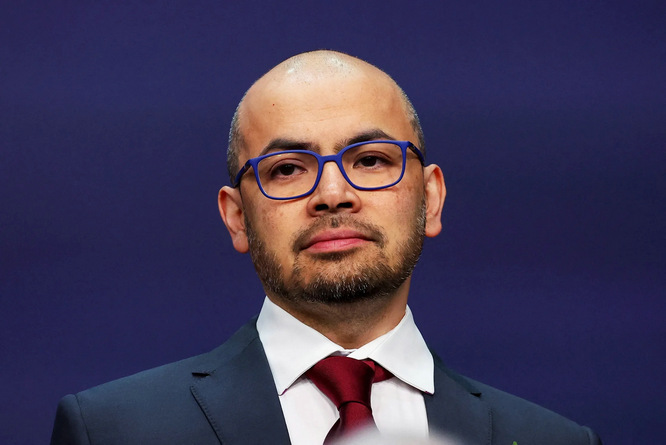In the realm of artificial intelligence, Demis Hassabis shines like a brilliant star, illuminating the path of technological frontiers. As CEO and co-founder of Google DeepMind, he steers his team with exceptional foresight, profound academic grounding, and a spirit of innovation, consistently pushing the boundaries of human understanding of the realms of intelligence.

PART I: The Sage of Wisdom: Hassabis's Philosophy on AI
1. Beyond Mimicry: Hassabis's Vision for AI Innovation
"Artificial intelligence aims not merely to mimic human intelligence but to surpass it." This succinct encapsulation of AI's essence by Hassabis suggests that AI should not be confined to replicating human thought patterns. Instead, through algorithmic revolutions and computational leaps, he envisions creating a new form of intelligence capable of autonomous learning, adapting to a wide array of tasks, and transferring knowledge across domains. This philosophy breaks from the traditional "machine mimics the brain" paradigm, unlocking endless possibilities in AI research.
2. The Alpha Series: Tangible Expressions of AI Innovation
Hassabis's AI philosophy comes to life in DeepMind's landmark projects such as AlphaGo, AlphaZero, and AlphaStar. These "Alpha" offspring demonstrated superhuman performance in games like Go, chess, shogi, and StarCraft II, revealing AI's potential to exceed human intellect in specific domains. They validate Hassabis's stance that AI can surpass human intellect without following human cognitive paths, especially in specialized tasks.
3. The Deep Learning Revolution: From Theory to Practice
Hassabis's advocacy for deep learning technology, exemplified in its application, bolsters his AI philosophy. DeepMind's success with DQN (Deep Q-Network) in Atari games proved the decision-making prowess of deep learning models in complex environments, ushering in a new era of deep reinforcement learning. Furthermore, AlphaFold's groundbreaking achievement in predicting protein structures via deep learning, solving a major puzzle in biology, earned it Science magazine's Breakthrough of the Year in 2021. These instances demonstrate Hassabis's AI innovation vision translating into tangible scientific progress and applications.
PART II: Scientific Feats: Milestones of DeepMind's Achievements
1. AlphaGo: A Pivotal Breakthrough in AI
"Historical significance lies not just in DeepMind's victory through AlphaGo, but in AI's triumph overall." Hassabis's declaration underscores AlphaGo's epochal impact. In 2016, AlphaGo defeated world champion Lee Sedol at Go, stunning the globe. This feat showcased AI's extraordinary capabilities in strategic games, symbolizing its ability to outsmart top human intellect in specific areas. AlphaGo's success marked a milestone in AI research for DeepMind, laying the groundwork for subsequent AlphaZero and AlphaStar projects.
2. AlphaZero: The Marvel of Autonomous Learning
"AlphaZero is a genuine universal learning system, capable of self-learning and excelling in any game with clear rules and defined outcomes." Hassabis's appraisal highlights AlphaZero's uniqueness. Unlike AlphaGo, which learned from human gameplay data, AlphaZero started from scratch, mastering chess, shogi, and Go through self-play. This scientific feat validates Hassabis's idea of AI's general learning capability and underscores DeepMind's prowess in reinforcement learning.

3. AlphaStar: Conqueror of the Gaming Realm
"The accomplishments of AlphaStar affirm AI's potential not just to excel in board games but also dominate real-time strategy games." Hassabis's statement underscores AlphaStar's importance. In 2019, AlphaStar defeated professional players in StarCraft II, demonstrating AI's decision-making agility and adaptability in dynamic environments. This achievement set new records for AI in gaming and provided valuable lessons for real-world applications like autonomous driving and military strategy.
4. AlphaFold: AI's Decoding of Life's Blueprint
"Historically significant, AlphaFold's breakthrough might rank among AI's greatest contributions to science." Hassabis's accolade highlights AlphaFold's importance. In 2020, AlphaFold accurately predicted the 3D structures of most known proteins, solving a half-century-old biological mystery。This scientific triumph not only revolutionized drug discovery and disease diagnosis but also highlighted AI's enormous potential in fundamental scientific research.
PART III: Empowering with AI: From Labs to the Real World
1. Energy Optimization: AI for a Greener Future
"AI can aid us in resource efficiency, reducing carbon emissions, contributing to Earth's sustainable future." Hassabis's vision manifests in DeepMind's energy optimization projects. Since 2016, DeepMind and Google have AI to optimize data center cooling, enhancing energy efficiency by 15% and saving millions annually while slashing carbon emissions. This showcases AI's potential in energy conservation and green energy, bolstering global efforts towards carbon neutrality.

2. Healthcare: AI as Guardian of Life
"AI's application in healthcare could transform diagnosis, treatment, and disease prevention." Hassabis's prediction is materializing through DeepMind Health's initiatives. Their Streams app, developed in collaboration with the UK's NHS, uses AI to predict acute kidney injury, improving patient outcomes. AlphaFold's protein structure predictions further fuel drug development, accelerating the process and benefiting patients worldwide. These examples highlight AI's broad application in healthcare, enhancing treatment efficacy, reducing costs, and advancing medical research.
3. Environmental Protection: AI Safeguarding Our Planet
"AI can help us understand, predict, and respond better to global challenges like climate change." Hassabis's vision takes shape in DeepMind's environmental projects. Collaborating with the UK Met Office, DeepMind enhances weather forecasting accuracy, supporting disaster prevention. AI is also utilized to monitor deforestation and ocean pollution via satellite imagery, providing technical support for environmental protection. These cases reveal AI's vast potential in environmental protection, enhancing conservation efforts, biodiversity protection, and climate response.
4. Smart Cities: AI Shaping the Future Urban Landscape
"AI will serve as the nervous system of future cities, enabling smart, efficient, and sustainable urban living." Hassabis's concept is realized in DeepMind's urban intelligence projects. Partnering with cities like London and Toronto, AI optimizes public transport, predicts energy demands, and manages infrastructure, enhancing city management and quality of life. These instances highlight AI's pivotal role in smart city development and its significance in boosting operational efficiency, optimizing resources, and enhancing public services.

PART IV: Ethical Watchdog: Hassabis's Moral Compass for AI
1. Ethical Framework: Setting Boundaries for AI
"AI ethics is among the defining issues of our time; it must be addressed seriously." Hassabis's warning underscores his commitment to AI ethics. Under his leadership, DeepMind established an Ethics & Society team and published the 'DeepMind AI Ethics Research Framework,' outlining ethical principles for AI research and application. This framework embodies fairness, transparency, control, and benefit, guiding ethical practice in the AI field.
2. Data Privacy: Safeguarding Personal Data Rights
"In the AI era, data privacy is a fundamental human right." Hassabis's view reflects his concern for data privacy. Amid controversy over data usage in their partnership with the NHS, Hassabis vowed, "We will adhere strictly to data protection laws, ensuring patient data safety." Measures like establishing an independent review panel and refining data handling processes were implemented, underscoring DeepMind's commitment to data privacy compliance and transparency.
3. AI Fairness: Eliminating Algorithmic Bias
"AI must be fair, avoiding all forms of discrimination." Hassabis's call emphasizes his pursuit of AI fairness. Acknowledging biases in certain AI models, DeepMind actively conducts fairness research, developing tools like Fairness Indicators to detect and correct discriminatory elements in models. Collaborating with academia and policymakers, they also drive industry standards and regulations for AI fairness. These actions confirm Hassabis's commitment to creating unbiased AI systems that benefit all.
4. AI Governance: Building a Global Ethical Consensus
"AI ethics requires global cooperation and dialogue." Hassabis's call demonstrates his insight into AI's global governance. Engaging in international AI ethics discussions with entities like the UN and the WEF, DeepMind fosters global exchange and collaboration. As a co-founder of AI Now Institute, Hassabis contributes to ethical guideline formulation, providing intellectual support for global AI governance. These endeavors aim to establish a universal consensus on AI ethics, fostering healthy AI development.
Conclusion:
Demis Hassabis, helmsman of Google DeepMind and AI's visionary, leads us into a future reshaped by AI with his profound insights and relentless exploration. His scientific achievements, practical applications, and ethical considerations paint a comprehensive landscape of AI's development, reminding us to embrace progress while upholding human values, responsibly guiding this transformative force. With Hassabis at the helm, we look forward to DeepMind continuing to break new ground, uncovering more secrets of wisdom, and co-creating a smarter, fairer, and more sustainable future.
